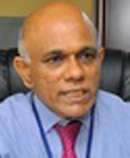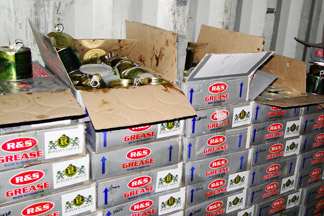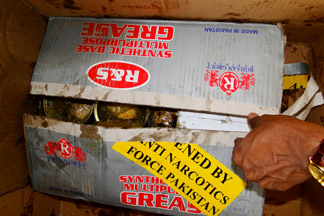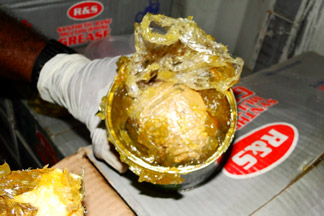Largest heroin haul ever in South Asia detected
By Manjula Fernando
 |
| Malie Piyasena |
 |
| G.B.Gnanaraj |
Fifty-three-year-old Kashif met Mohammed Kamil in Kuwait some five
years ago. They were expatriate workers looking for greener pastures in
the oil rich State. A friendship developed between Kashif an engineer
from Pakistan and Mohammed from Sri Lanka who then worked as a driver
for a wealthy Kuwaiti family.
Mohammed's wife too was employed as a housemaid in the same house.
After some years the friends parted ways. Both returned home to their
countries but the friendship did not end there.
In one of their numerous communications, Kashif suggested that they
start up a joint business with the money they earned in the desert land.
'Rohaan Impex - Sri Lanka' came to exist as a result, it was registered
with the Registrar of Companies in Sri Lanka in 2011. On July 3, G.B.
Gnanaraj a senior officer attached to the Custom's Revenue Task Force
received a phone call from one of his trusted informants. He conveyed
the information that a 40 foot container had arrived in the Colombo Port
from Pakistan and it contained narcotics.
No indication of the size of the consignment was made by the caller,
neither did he describe the type of narcotics in the container. Hence
Gnanaraj little to believe that they were about to make the detection of
a lifetime. However, in keeping with set guidelines of any narcotic
detection they exercised maximum precaution to set the net to apprehend
the importer as well as the exporter.
After hanging up, the senior customs officer did what was required of
him. He shared the information with his immediate and trusted bosses.
Together they weighed the credibility of the informant. Gnanaraj assured
that the man was one of his most reliable informants, going by past
information he had communicated.
Initial inquiries revealed that vessel, Northern Power which
delivered the container had arrived in the Port on June 22. The
container was loaded from the Karachi Port. The investigating officers
knew they had to make their next move carefully. If the consignee smell
anything fishy a claim would not be made on the container and arresting
the culprits could be a distant dream. On the same day that the
information was received by Gnanaraj, a case was filed at the Customs
Central Case registry and necessary steps were taken to prevent the
container from being released.
 |
| Neatly stacked
cardboard boxes with tins of grease |
 |
| The stickers
bearing Pakistani Anti Narcotics Force clearance but the whole
container load had packets of narcotics neatly concealed in the
tins of grease |
 |
| Sealed 'brown
sugar' inside the tin |
Then the investigating team sought the Attorney General's advice as
to how they should proceed. The AG's advice was that they should not
make any move to open the container or demand for an examination of
contents until a customs declaration is submitted by the importer so
that they had a hold on the consignee. This was important as on earlier
occasions, they have faced difficulties to apprehend the suspects
because they denied any connection once the contraband is exposed before
any claim on the imported goods are made. On August 28, after nearly two
months a clearing agent for the local consignee submitted a declaration
to clear the cargo. It was the break the RTF officers were waiting for.
According to the declaration the container had 17,500 tins of
synthetic grease and some items of ceramic sanitary-wear and
plastic-wear. The reason given by the importer for the two-month delay
to clear goods was that they were working on a permit . A permit was
required to import natural grease but in this case the consignment
carried synthetic grease hence there was no such requirement.
The Customs informed the consignee that they needed to do a routine
examination of the container. The importer was asked to get down the
Pakistani exporter to be present when the container was opened.
Determined not to make them suspicious, they made sure the request was
nothing out of the ordinary.
To conduct the examination, the container was transferred to the
Orugodawatte container yard on August 29, accompanied by Customs
officials.
Meanwhile, the Police Narcotics Bureau in a letter dated July 23,
sought the Customs' permission to allow an inspection of the particular
container in connection with a case they were working on. The Customs
therefore informed the PNB sleuths to be present at the examination
scheduled on August 30.
On Friday, August 30 the Clearing Agent flanked by the importer, his
Pakistani friend and a local interpreter arrived at the Orugodawatte
container yard.
Before the container was opened, upon asking by the officers, the
exporter confirmed that the container was in its original form. Again he
confirmed that there were no signs of tampering, before the customs
began breaking some of the sealed grease tins.
As the officials start opening the grease tins one by one, they made
a shocking discovery, concealed inside the tins, they found large
polythene packs of heroin. There were not less than 1262 such tins
carrying brown sugar, among the 17,500 tins labeled 'Synthetic
Multipurpose Grease'. The shocking contraband weighing 261.292 kg had a
street value of Rs. 2.6 billion.
It was reportedly South Asia's biggest heroin detection by the
Customs.
The officials arrested the importer, exporter and the interpreter.
The suspects have so far denied any knowledge of the massive contraband.
The Customs officials say the men were dummies used by a kingpin in the
business or they were using the age-old tactic to avoid life terms in
prison.
The men would have turned up for the examination because Director RTF
Malie Piyasena said they may have been confident of their concealing
strategy and at no point of time would have suspected that the Customs
had stumbled and detected the dangerous cargo. Some of the cardboard
packages where the grease tins were packed had Pakistan customs
clearance seal. "It could be a forged seal or the Pakistani Customs may
have done a random check and missed the narcotics." This fact too could
have boosted their confidence.
The Customs investigations indicate the local importer had registered
Rohaan Impex - Sri Lanka two years ago and the address bearing Rohaan
Impex is at Maligawatte, Railway Quarters. It was a house belonging to
his father who is an ex-Railway employee. The man is residing in Maho.
This had been the first commercial import done by his company.
They have also found that the Pakistani national owned the particular
brand of synthetic grease but the packaging had been done in a factory
hired by him. He has claimed that he was a thriving businessman having
interests in Dubai, Kuwait, Pakistan and Sri Lanka. Rohaan Impex is the
name of his company. According to the Customs the heroin had been
concealed inside the tins at the factory itself and not later.
The Police Narcotics Bureau is conducting further investigations into
unsolved areas of the case including the speculation whether if Sri
Lanka was a transit point for the lethal contraband.
The story is based on investigations conducted by the Revenue Task
Force Unit of the Sri Lanka Customs under the direction of Director
Malie Piyasena, Deputy Directors S.Edirimanna and Chandraratne.
Investigations were handled by Superintendents of Customs G.B.Gnanaraj,
J.A.S.Jayakody and Parakrama Basnayake.
The officers of the Customs Narcotic Control Unit were also involved
in solving the case. |


